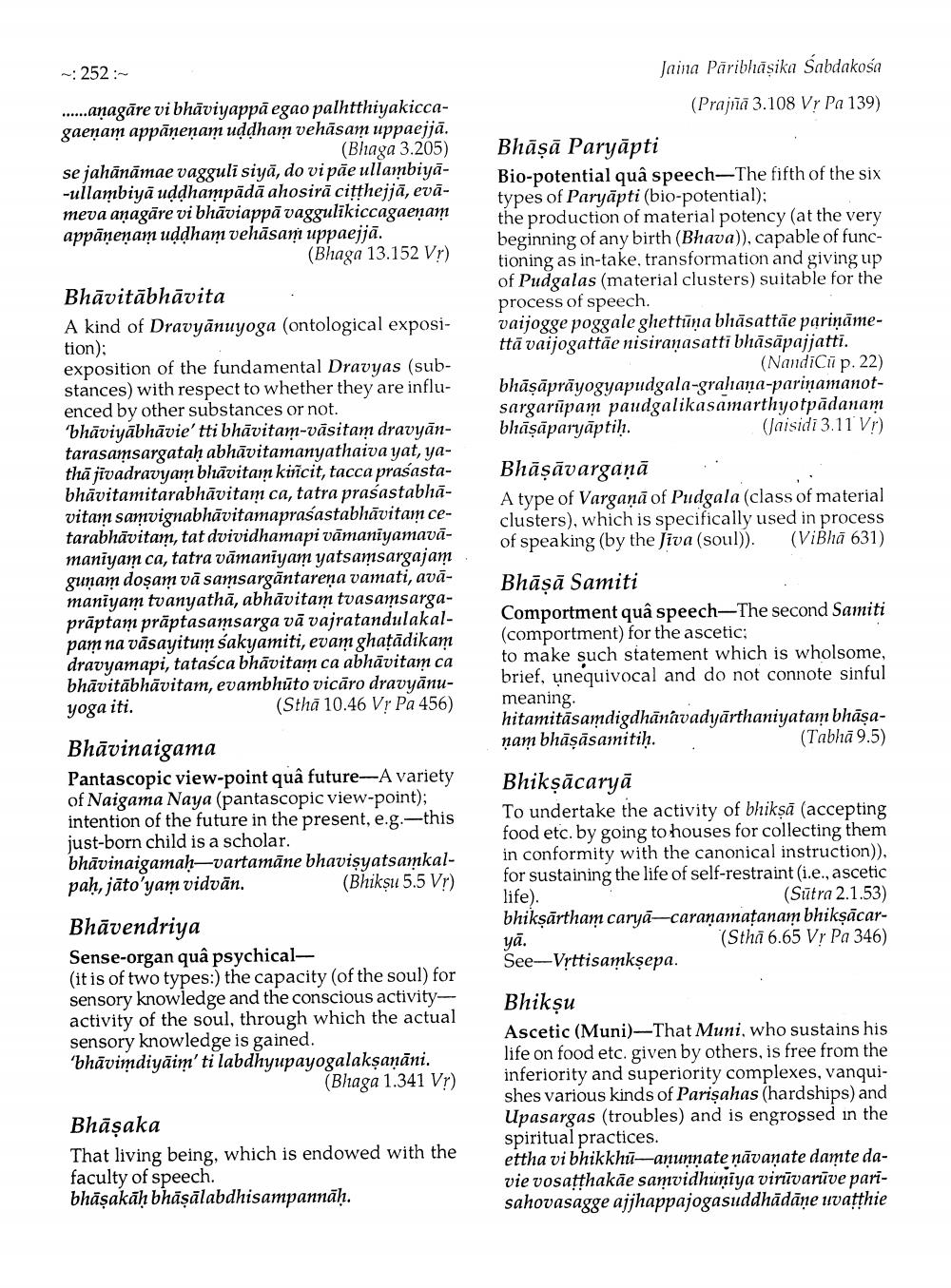________________
~: 252:~
.......anagare vi bhaviyappa egao palhtthiyakiccagaeṇam appäneṇam uddham vehäāsam uppacjjā. (Bhaga 3.205) se jahanamae vagguli siya, do vi pãe ullambiya-ullambiya uddhampädä ahosira ciṭṭhejja, evameva anagare vi bhaviappa vaggulikiccagaenam appänenam uddham vehäsam uppaejjā. (Bhaga 13.152 Vr)
Bhävitäbhävita
A kind of Dravyanuyoga (ontological exposition):
exposition of the fundamental Dravyas (substances) with respect to whether they are influenced by other substances or not. 'bhaviyabhävie' tti bhävitam-väsitam dravyäntarasamsargatah abhävitamanyathaiva yat, yatha jivadravyan bhävitam kiicit, tacca prasastabhävitamitarabhävitam ca, tatra prasastabhavitam samvignabhävitamaprasastabhävitam cetarabhävitam, tat dvividhamapi vamaniyamavamaniyam ca, tatra vamaniyam yatsamsargajam gunam doṣam va samsargāntareṇa vamati, avamaniyam tuanyatha, abhävitam tvasamsargapräptam präptasamsarga vā vajratandulakalpam na vasayitum sakyamiti, evam ghatädikam dravyamapi, tatasca bhävitam ca abhävitam ca bhävitäbhävitam, evambhuto vicaro dravyānuyoga iti. (Stha 10.46 Vr Pa 456)
Bhāvinaigama
Pantascopic view-point quâ future-A variety of Naigama Naya (pantascopic view-point); intention of the future in the present, e.g-this just-born child is a scholar. bhāvinaigamaḥ vartamane bhaviṣyatsankalpah, jato'yam vidvän. (Bhiksu 5.5 Vr)
Bhāvendriya
Sense-organ quâ psychical
(it is of two types:) the capacity (of the soul) for sensory knowledge and the conscious activityactivity of the soul, through which the actual sensory knowledge is gained. 'bhavimdiydim' ti labdhyupayogalakṣaṇāni. (Bhaga 1.341 Vr)
Bhāṣaka
That living being, which is endowed with the faculty of speech.
bhāṣakaḥ bhāṣālabdhisampannāḥ,
Jaina Paribhäṣika Sabdakosa (Prajid 3.108 Vr Pa 139)
Bhāṣā Paryapti
Bio-potential quâ speech-The fifth of the six types of Paryapti (bio-potential):
the production of material potency (at the very beginning of any birth (Bhava)), capable of functioning as in-take, transformation and giving up of Pudgalas (material clusters) suitable for the process of speech.
vaijogge poggale ghettüṇa bhasattae pariņāmettä vaijogattae nisirayasatti bhāsāpajjatti. (NandiCi p. 22)
bhäṣaprayogyapudgala-grahana-pariņamanotsargarupam pandgalikasamarthyotpadanam bhäṣaparyapti. (Jaisidi 3.11 Vr)
Bhāṣāvargaṇā
A type of Vargand of Pudgala (class of material clusters), which is specifically used in process of speaking (by the fiva (soul)). (Viẞha 631)
Bhăşă Samiti
Comportment quâ speech-The second Samiti (comportment) for the ascetic:
to make such statement which is wholsome, brief, unequivocal and do not connote sinful meaning.
pam bhāṣasamitih.
hitamitasandigdhanavadyarthaniyatam bhāṣa(Tabha 9.5)
Bhikṣācaryā
To undertake the activity of bhikṣa (accepting food etc. by going to houses for collecting them in conformity with the canonical instruction)). for sustaining the life of self-restraint (ie., ascetic life). (Sutra 2.1.53) bhikṣartham carya-caranamaṭanam bhikṣācaryā. (Stha 6.65 Vr Pa 346)
See-Vrttisamksepa.
Bhiksu
Ascetic (Muni)-That Muni, who sustains his life on food etc. given by others, is free from the inferiority and superiority complexes, vanqui shes various kinds of Parisahas (hardships) and Upasargas (troubles) and is engrossed in the spiritual practices.
ettha vi bhikkhu-anomate nāvanate damte davie vosaṭṭhakãe samvidhuniya virivarive parisahovasagge ajjhappajogasuddhädäṇe uvaṭṭhie




